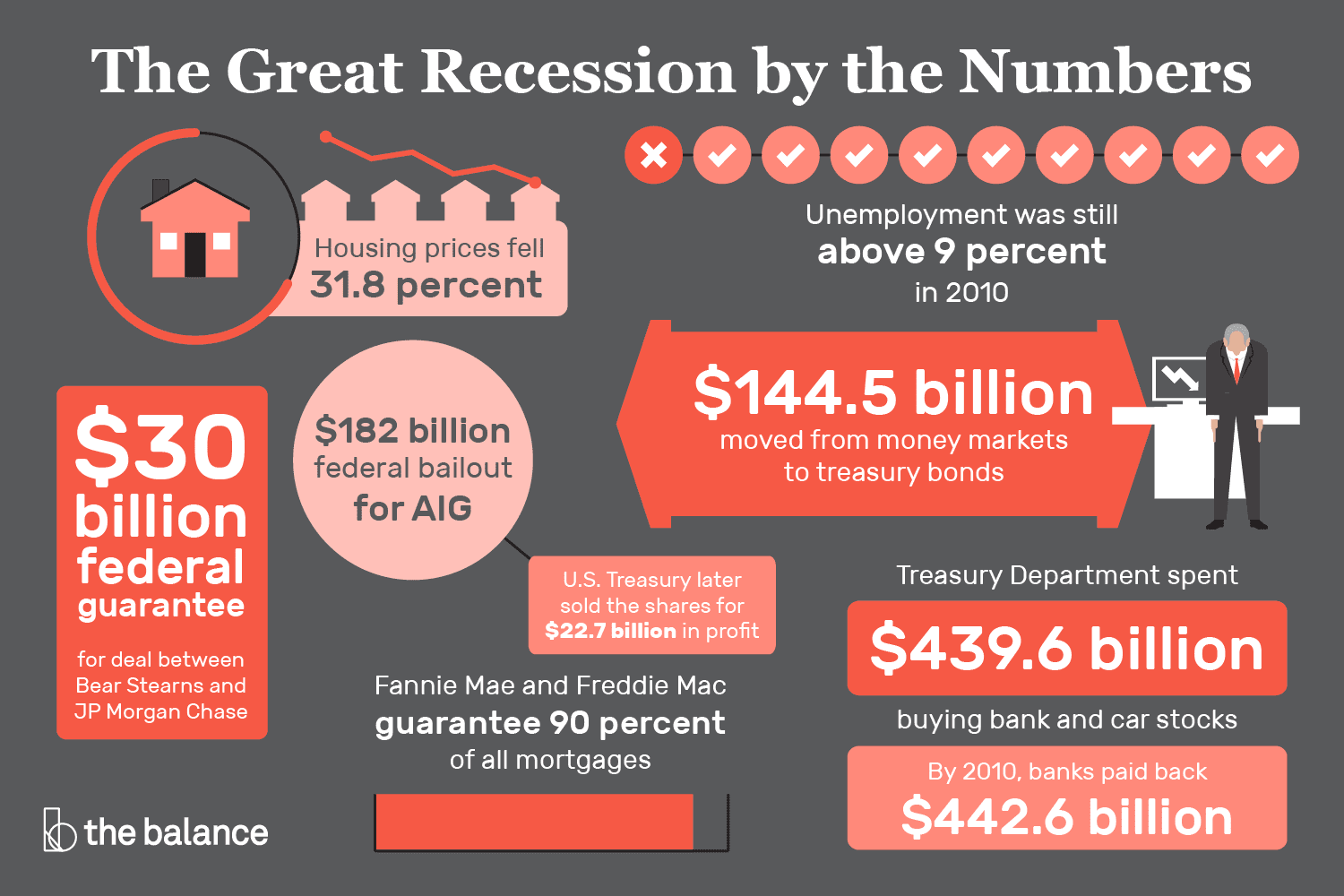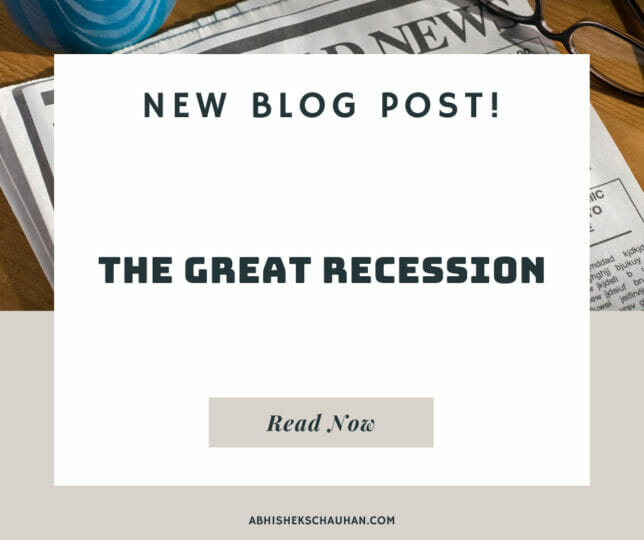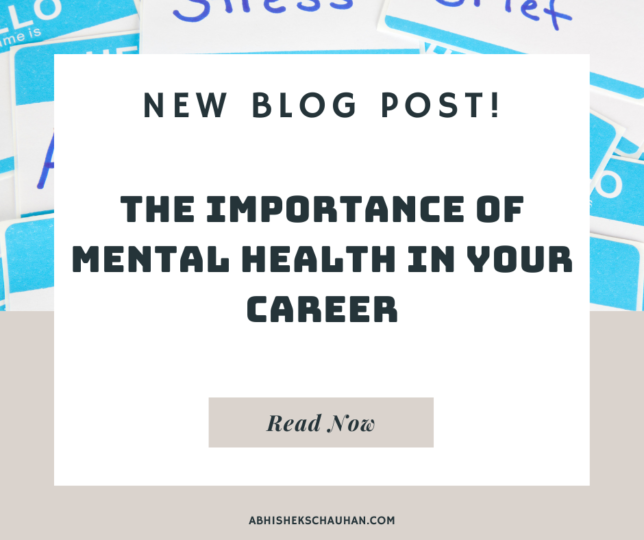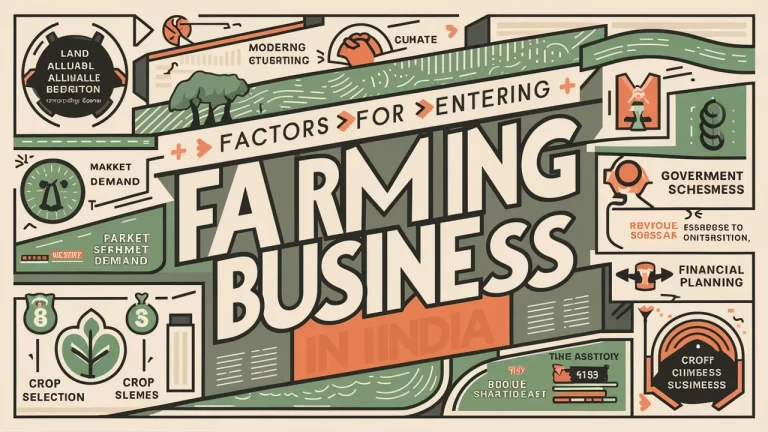The Great Recession What Happened and How to Avoid It in the Future
Welcome to my blog! I’m here to talk about the Great Recession, what caused it, and how we can avoid it in the future.
The Great Recession was a tough time for everyone. But now that it’s over, it’s important to learn from what happened to prevent something like it from happening again.
I’ll be sharing my thoughts on the causes of the recession and what we can do to avoid another one in the future. I hope you’ll join me in this discussion!
What is the Great Recession?
The Great Recession was a period of the global financial crisis that lasted from 2007 to 2008. It was the worst economic downturn since the Great Depression of the 1930s.
The Great Recession began in the United States with the housing market’s collapse and quickly spread to other countries around the world. The effects were severe, leading to widespread unemployment, increases in poverty and inequality, and a decrease in global trade and investment.
The Great Recession was caused by several factors, including sub-prime lending practices, high levels of debt, and financial deregulation. These factors created an unstable economy that could not withstand a sudden shock, such as a sharp increase in oil prices or a housing market crash.
It is important to address these underlying causes to avoid another Great Recession. This can be done through financial regulation, increased transparency in the financial system, and improved economic policies.

What caused the Great Recession?
In order to understand what caused the Great Recession, we must first understand what a recession is. A recession is two consecutive quarters of negative economic growth measured by a country’s Gross Domestic Product (GDP).1 So, what caused GDP to shrink in the U.S. during 2008 and 2009?
Many factors contributed to the Great Recession, but most economists agree that the leading cause was the housing market crash.2 The housing market crash is thought to have been caused by a combination of things, including:
-The subprime mortgage crisis is when people with poor credit are given mortgages with high-interest rates. These mortgages are often “adjustable-rate,” meaning the interest rate can increase over time. This makes it more likely that people will default on their loans (stop making payments).
-The housing bubble: This is when home prices go up a lot in a short time, and then they stop going up or start going down. This makes it harder for people to buy homes and makes it more likely that people who already have homes will default on their mortgages if they can’t sell their homes for as much money as they owe on their mortgages.
-Unemployment: If people lose their jobs, they may not be able to make their mortgage payments.
-The stock market crash happens when the stock market goes down sharply in value. When this happens, people feel less wealthy and may spend less money, leading to decreased economic activity and GDP.
These factors all led to a decrease in house demand, which led to prices falling and more foreclosures (when people can’t make their mortgage payments and lose their homes).3 The decrease in demand for houses also led to a decrease in construction activity and related jobs, which made the recession even worse.4
References:
1. “Recession.” Investopedia. N.p., n.d. Web. 17 Apr. 2017.
How did the Great Recession affect the economy?
The Great Recession was a global financial crisis erupted in the United States in December 2007 and quickly spread throughout the developed world. It was characterized by a sharp increase in unemployment, a collapse of the housing market, and a dramatic increase in bankruptcy filings and foreclosures.
In the United States, the Great Recession officially lasted from December 2007 to June 2009, making it the most prolonged recession since World War II. However, many economists believe the country’s economy did not fully recover until 2015.
The Great Recession had several very damaging effects on the economy. One of the most serious was the rise in unemployment. In October 2009, the unemployment rate reached 10%, its highest level since 1983. By comparison, before the recession, the highest unemployment rate during any month of the Bush presidency was just 5.8%.
Another significant effect of the Great Recession was the housing market’s collapse. Home prices peaked in early 2006 and then began to fall sharply. This led to a wave of foreclosures as homeowners found themselves owing more on their mortgages than their homes were worth. The number of foreclosures reached a record high in 2010, causing even further damage to home prices.
The Great Recession also caused a significant increase in bankruptcy filings and corporate bankruptcies. In 2008, nearly 1.5 million personal bankruptcies were filed in the United States, an increase of 32% from 2007. That year also saw a dramatic increase in corporate bankruptcies, with some of America’s largest companies filing for Chapter 11 protection, including General Motors and Lehman Brothers.
The Great Recession had far-reaching effects on the American economy and economies worldwide. Unfortunately, its effects are still being felt today, and it will likely take years for a full recovery.
What are the long-term effects of the Great Recession?
Many Americans are still feeling the long-term effects of the Great Recession. The unemployment rate remained high for years after the recession ended, leaving millions of workers without jobs. And, even though the economy has begun to improve, wages have stagnated for many workers. This can make making ends meet difficult and lead to financial insecurity.
In addition to economic insecurity, the Great Recession also led to an increase in poverty rates. According to the U.S. Census Bureau, the poverty rate rose from 12.5 per cent in 2007 to 15 percent in 2010. And while it has fallen slightly since then, it is still higher than before the recession began. Moreover, the increase in poverty can ripple effect on society, leading to increased crime rates and social problems.
The Great Recession also had a profound effect on America’s homeownership rate. The housing market crash led to millions of Americans losing their homes to foreclosure. And even though the housing market has recovered somewhat since then, many families still struggle to keep up with their mortgage payments or rent. This can lead to homelessness or even more severe financial problems.
How can we avoid another Great Recession?
It is essential to learn the lessons of the Great Recession to avoid future repeats. One way to do this is by increasing regulation of the financial sector. This will help to prevent reckless lending and borrowing practices that can lead to an economic bubble.
In addition, it is important to increase government spending during periods of economic downturn. This will help to stimulate the economy and prevent widespread unemployment. Finally, it is important to educate the public on financial literacy. This will help individuals make intelligent decisions with their money and avoid taking on too much debt.
What can we learn from the Great Recession?
The Great Recession was a global financial crisis that democracies around the world are still grappling with its repercussions today. The event was caused by a number of factors, including the bursting of the housing bubble, reckless financial deregulation, and subprime lending practices. As a result, over 8 million jobs were lost in the United States, and $19 trillion in household wealth disappeared.
So what can we learn from the Great Recession? For one, it’s important to have regulations in place to prevent another housing bubble from forming. It’s also crucial to consider the risks associated with deregulation and subprime lending. And finally, we must remember that when economies experience hardship, it’s important to come together as a society and support one another. Only by learning from our mistakes can we hope to avoid another catastrophe like the Great Recession in the future.
What policies caused the Great Recession?
In September 2008, the global economy collapsed. Lehman Brothers, a central investment bank, filed for bankruptcy, and the stock market crashed. The event became known as the Great Recession.
The Great Recession was caused by a number of factors, including:
– too much debt: both households and financial institutions had amassed too much debt, which made them vulnerable to shocks;
– lax regulation: there was insufficient regulation of the financial sector, which allowed risky behaviour to go unchecked;
– economic imbalances: global trade imbalances meant that countries with large trade surpluses (such as China) were flooding other countries with cheap exports, while countries with large trade deficits (such as the United States) were unable to pay for these imports;
– housing bubble: soaring property prices in many countries (such as the United States) created a housing bubble that eventually burst, leading to significant losses for banks and other financial institutions;
– falling share prices: falling asset prices (such as share prices) caused losses for banks and other investors.
The Great Recession led to widespread unemployment and poverty around the world. It also contributed to a number of social and political problems, such as the rise of populism.
What can we do to prevent another Great Recession?
The Great Recession was a global financial crisis that lasted from 2007 to 2009. It was the worst economic downturn since the Great Depression of the 1930s. The recession began in the United States but quickly spread to other countries worldwide.
Several things can be done to prevent another Great Recession from happening. First, nations should work to improve their fiscal policies. This means reducing government spending and increasing taxes. This will help to reduce deficits and debt levels. Second, nations should also pursue more balanced trade policies. This means reducing trade imbalances between countries. Finally, nations should work to improve financial regulation and oversight. This will help to prevent financial bubbles and crashes in the future.
What were the consequences of the Great Recession?
The Great Recession had a number of consequences, both immediate and long-term.
In the short term, the most obvious consequence was many people who lost their jobs. For example, in the United States, the unemployment rate peaked at 10% in October 2009 before falling back to around 5% by 2019. However, this decline in the unemployment rate was not evenly distributed across all groups of workers. For example, the unemployment rate for black workers peaked at 16.8% in March 2010 before falling back down to around 6.7% by 2019.
In the longer term, one of the most significant consequences of the Great Recession was the increased level of household debt. In the years leading up to the recession, many households took on large amounts of debt, often using their homes as collateral. As a result, when house prices started to fall during the recession, many households owed more money than their homes were worth. This led to a wave of foreclosures, evictions, and negative equity (meaning that you owe more on your mortgage than your home is worth).
The Great Recession also had a number of other consequences, such as an increase in poverty rates and a decline in life expectancy.
How can we fix the economy after the Great Recession?
The world economy has faced its most significant challenge in the past decade since the Great Recession of 1929.
The Great Recession was caused by a number of factors, including the bursting of the housing bubble, rising oil prices, and the subprime mortgage crisis. These factors led to a loss of confidence in the global financial system, which caused banks to stop lending and businesses from stopping investing. This led to a decrease in economic activity and an increase in unemployment.
The governments of the world’s significant economies responded to the recession by Stimulus spending, providing bailouts to banks and businesses, and introducing quantitative easing measures. These measures helped to avoid the collapse of the global economy, but they were not without their criticisms.
Now that the world economy is slowly recovering, there is a debate about what should be done to prevent another recession. Some economists argue that government intervention is necessary to stabilize the economy, while others believe that markets should be allowed to self-regulate.
What do you think is necessary to fix the economy after the Great Recession?







